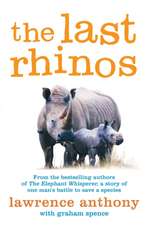The Physiology of Aggression and Defeat: Proceedings of a symposium held during the meeting of the American Association for the Advancement of Science in Dallas, Texas, in December 1968
Editat de Basil Eleftheriouen Limba Engleză Paperback – 21 feb 2012
Preț: 389.11 lei
Nou
Puncte Express: 584
Preț estimativ în valută:
74.47€ • 77.46$ • 61.48£
74.47€ • 77.46$ • 61.48£
Carte tipărită la comandă
Livrare economică 12-26 aprilie
Preluare comenzi: 021 569.72.76
Specificații
ISBN-13: 9781468419344
ISBN-10: 146841934X
Pagini: 328
Ilustrații: XII, 312 p.
Dimensiuni: 152 x 229 x 17 mm
Greutate: 0.44 kg
Ediția:Softcover reprint of the original 1st ed. 1971
Editura: Springer Us
Colecția Springer
Locul publicării:New York, NY, United States
ISBN-10: 146841934X
Pagini: 328
Ilustrații: XII, 312 p.
Dimensiuni: 152 x 229 x 17 mm
Greutate: 0.44 kg
Ediția:Softcover reprint of the original 1st ed. 1971
Editura: Springer Us
Colecția Springer
Locul publicării:New York, NY, United States
Public țintă
ResearchDescriere
This short volume contains papers presented at a special symposium, "The Physiology of Aggression and Defeat," during the MAS meetings in Dallas, Texas, in December, 1968. At a time when we need to understand the basic mechan isms underlying various forms of aggression, these papers report progress toward this goal. Although the many social, psychologic and economic causal mechanisms contributing to aggression have been reasonably well-understood for a number of years, the correlated physiological, biochemical, endocrinological and neurochemical changes taking place in an organism that is either the aggressor or the recipient of aggression have not been studied extensively, and the limited available data in the past have often been in con siderable conflict. These eight papers demonstrate that complex interac tions take place among the psychological, social, physio logical, biochemical, endocrinological and neurochemical factors involved in aggression and defeat. The general indications are that while the aggressor learns to survive and adapts readily to the fighting process, the vanquished, if he does not die, maintains an existence highlighted by severe and extensive changes in all physiologic and psycho logic systems. We cannot make sweeping generalizations to the human organism from the results of non-human animal experimentation. Nevertheless, it is well-known that in all animals, including the human, similar basic biochemi cal systems are involved.
Cuprins
Symposium: The Physiology of Aggression and Defeat An Introduction.- Theoretical Issues Concerning the Origin and Causes of Fighting.- Steroid Hormones and Aggressive Behavior in Mammals.- Effects of Aggression and Defeat on Brain Macromolecules.- Isolation, Reactivity and Aggression: Evidence for an Involvement of Brain Catecholamines and Serotonin..- Aggression, Noxiousness, and Brain Stimulation in Unrestrained Rhesus Monkeys.- A Preliminary Physiological Model of Aggressive Behavior.- Altered Adrenal Function in Two Combat Situations in Viet Nam.- Aggression: Summary and Overview.







